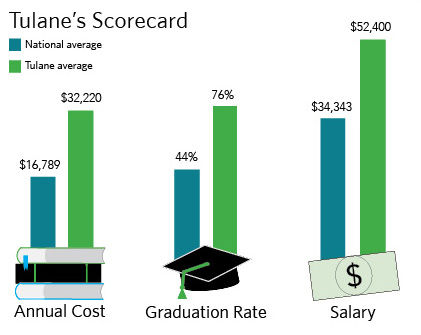Government Scorecard offers economic insight into higher education

Tulane’s Scorecard
September 30, 2015
The U.S. Department of Education recently updated College Scorecard, a website originally released in 2013 that provides data to help students make informed economic decisions about their education, to offer a new insight on Tulane’s comparative economic value.
“It seems to portray Tulane very favorably in terms of our outcome as far as student’s average salary and how we compare to our peer institutions with the amount of debt that our students take on,” Director of International Admission Jeff Schiffman said.
Since College Scorecard’s initial release in 2013, it has been redesigned based on input from students, families and their academic advisors. This new version of the site provides data in a more readable format for easier interpretation of the information provided.
College Scorecard provides “new and better data than what is available to students today,” U.S. Secretary of Education Arne Duncan said in a recent press release. “It will include the first reliable nationwide data on employment outcomes for students.”
The website offers searches based on size, location, programs and degrees. On each school’s page, you can find statistics regarding the diversity of the student body, average SAT and ACT scores and the school’s most popular majors.
The database offers unique data compared to other college search tools, like information regarding tuition, financial aid, loan repayment and average post-grad salary. These statistics, which go back 18 years and cover over 7,000 colleges, combine data from the U.S. Treasury and IRS with records from the U.S. Department of Education.
According to the website, Tulane’s average post-graduate salary, graduation rate and number of students paying down their debt are all well above average. Tulane’s annual average cost is not as appealing, however. The average annual cost of college is $16,789 while the average annual cost of Tulane is $32,220, according to College Scorecard.
This number varies between students based on scholarships and financial aid. Students can calculate their own average cost using Tulane’s net price calculator to factor in their own personal potential aid and scholarships.
President Obama hopes that the release of this data, which includes information regarding tuition, financial aid, loan repayment and expected salary, will increase transparency in higher education. By putting this data in the hands of the public, the Obama administration aims to encourage colleges to take responsibility for their role in making college an affordable experience that offers students the most value for their investment.
Factors such as a school’s campus life, social climate, extracurricular activities, political or religious affiliations, service opportunities and overall mission can indicate whether or not a student is suited for a particular school. These aspects are missing from the database, however.
College Scorecard also faces data limitations that could complicate creating an accurate picture of a university. For example, earnings information only comes from students who receive federal aid and is not divided up by area of study, both potentially skewing results.
According to freshman Elizabeth Smith, cost is not necessarily the most important factor to consider when college searching.
“Cost varies immensely from person to person so it is not as important of a factor since some get financial aid, scholarships, live off-campus and so on,” Smith said. “When applying to colleges, I wanted to know their admissions ratings, average SAT and ACT scores, how happy the students there were, the retention rate [and] diversity statistics.”
Schiffman agrees that the financial context is only a component to a student’s college search and that the term ‘fit’ is multifaceted.
“We always say at Tulane that there aren’t any bad schools in America, only bad fits,” Schiffman said. “So we want students that know they’re going to be both an academic fit and social fit as well as financial fit for Tulane. A family’s financial fit at a university is one part of the puzzle … I think it’s a really valuable tool, but I think it should be one tool in a toolkit of how to select a school.”





















Leave a Comment